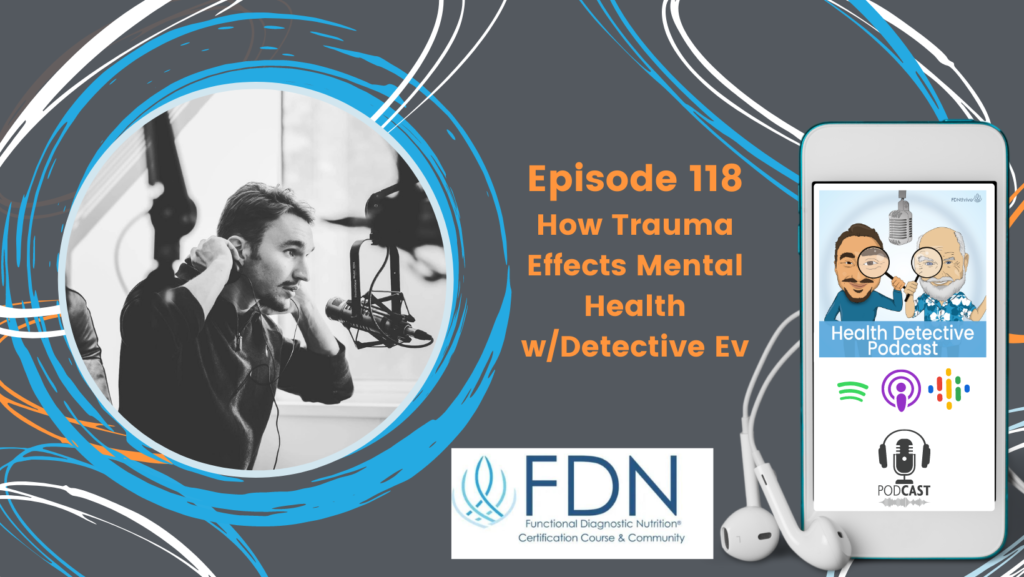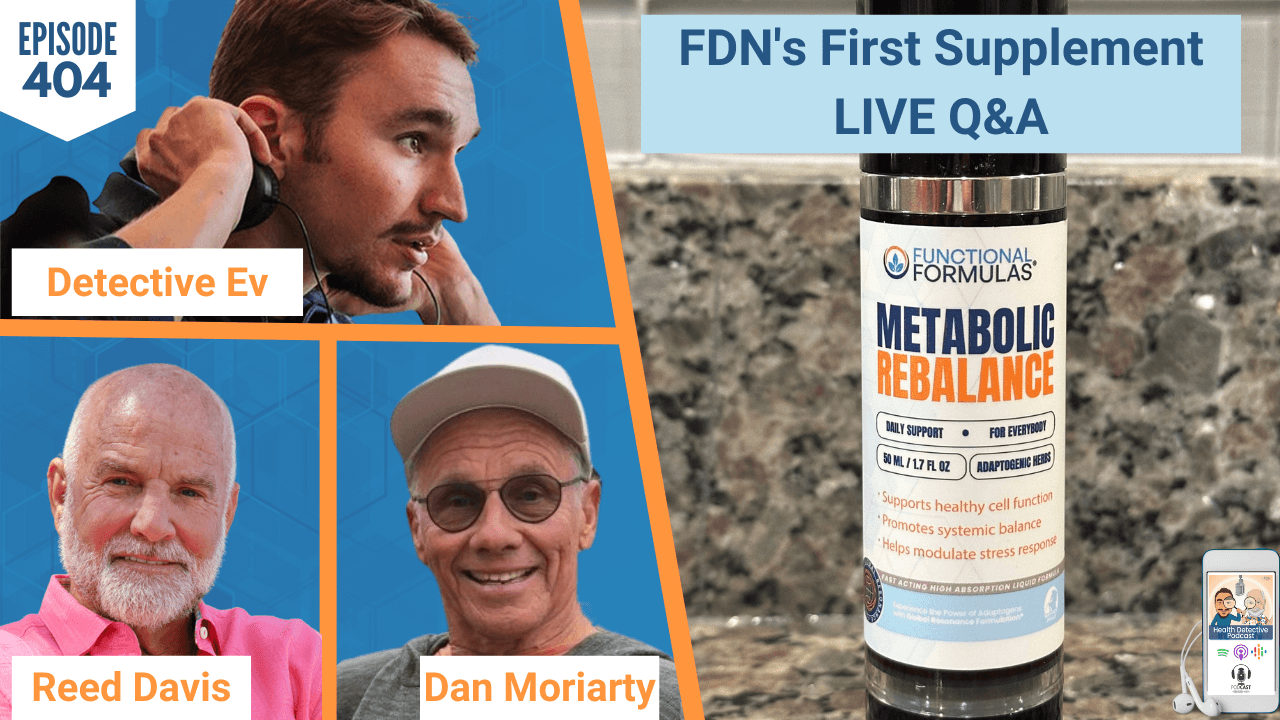Introduction
Hey, what’s going on my friends. Welcome back to another episode of the Health Detective Podcast by FDNthrive. My name is Evan Transue, AKA Detective Ev. I will be your host for today’s show. We’re talking about trauma and how it can relate to our mental health.
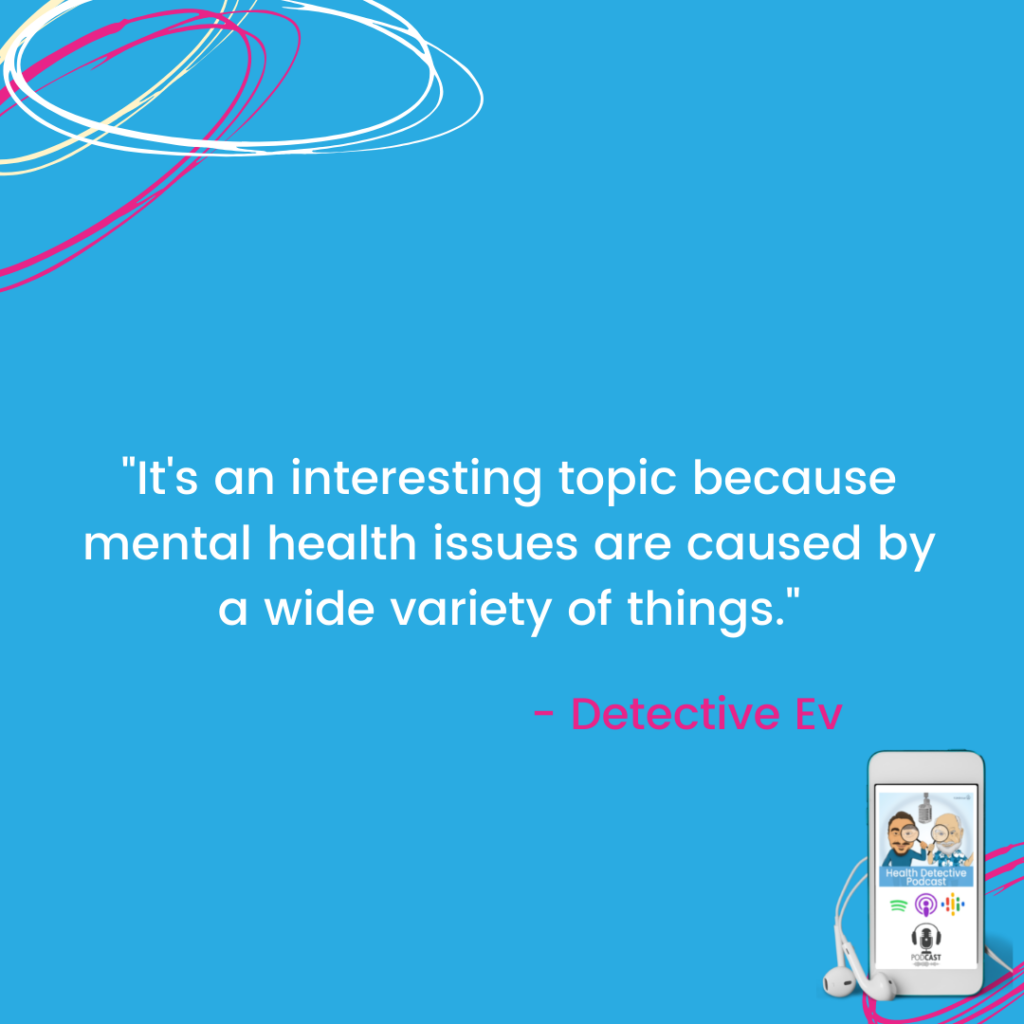
It’s an interesting topic because mental health issues are caused by a wide variety of things. One of the things you might’ve heard me say on this show before, if you’re a regular listener, is that we need to expand our awareness around these issues.
What happens is some people get into the world of functional medicine (I understand this because this is what happened to me). They didn’t really have a large amount of trauma in particular, yet they had a bunch of physical health issues too. No one ever looked at those physical health issues or their lifestyle or their diet. It turns out those were the things that needed to be looked at to really find resolution to their mental health issues. It wasn’t that they needed to be prescribed an SSRI necessarily, they needed help in other categories that they were not receiving from conventional medicine.
Okay. I can understand why then eventually you might come to the world of functional medicine. You finally get better after years or even decades of dealing with this stuff. Then all of a sudden, you’re like, well, you know what? Screw the conventional means. I don’t want to do that. I don’t think anyone should do that. It’s all functional.
Trauma Based vs. Nontraumatic
Okay. Well, let me challenge that. Because someone like myself (yes, this was what happened to me), five years old, I’m starting to deal with panic attacks. Prior to that, I had a pretty good life. Now I experienced some things later in life that definitely could be considered traumatic. I experienced many things as a result of my mental health issues that could be considered traumatic. But the fact of the matter is there was a time in Evan Transue’s life, when he did not really have anything close to any sort of major or even minor trauma and yet he’s dealing with mental health issues, diagnosable ones at that.
This eventually expanded from not just being panic attacks, but panic disorder, generalized anxiety disorder, major depressive disorder, hypochondriasis, and even OCD. Now, I was never diagnosed with OCD to be clear, but there’s other things. Yeah. Pretty scary stuff. Yet I didn’t have that trauma.
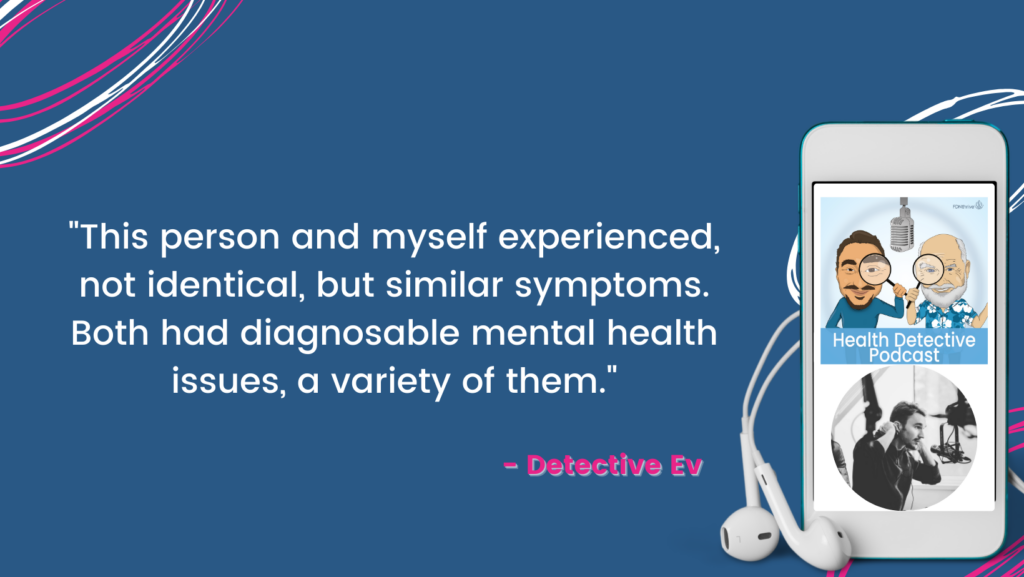
But then we have someone who was (and I’ll be vague with this), close to me in my life. Unfortunately, they’re no longer with us. And they had a terrible childhood. The stuff that happened to them trauma-wise is stuff that you almost can’t even make up to put in a movie. It’s just terrible. It’s unfair. It’s not right. It shouldn’t have happened to anyone, let alone a young person – a kid, at times. This person and myself experienced, not identical, but similar symptoms. Both had diagnosable mental health issues, a variety of them.
Trauma Needs to be Addressed
But do you think, based on what I just said, I don’t even have to get into details, do I? Based on what I just said, do you think it would have been fair to tell that second individual, my friend, that they needed to run some functional lab tests, or they needed to eat better, or they needed to get to bed on time?
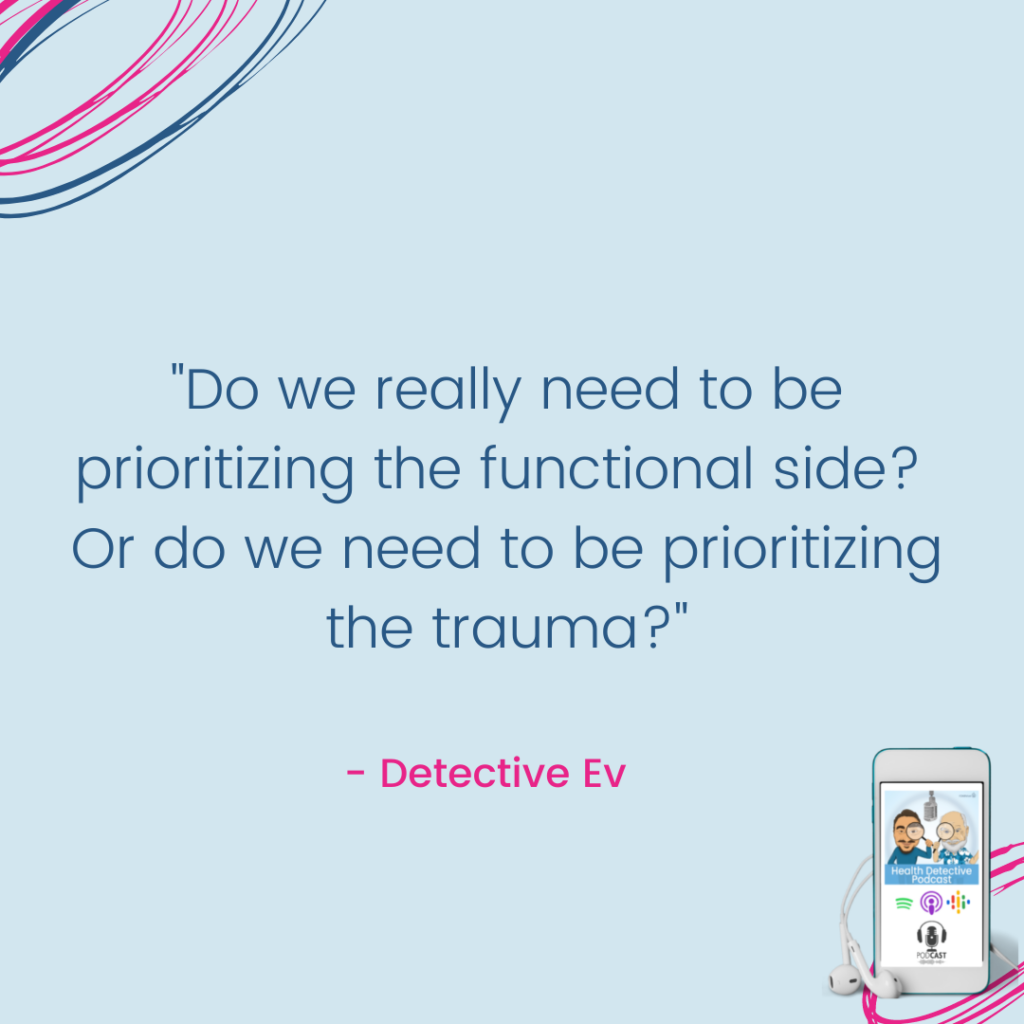
Now, I’m not saying those things wouldn’t have hurt, but do you really think that those would have been the main things that that person needed if they went through what they went through? And I will just put, if this somehow isn’t obvious to you, I’m walking on the line of the category of like abuse, basically, okay. So, I don’t need to give vivid details of what that entails but use your imagination. You know, it’s not good stuff. Not fair to anyone, let alone a kid. Do we really need to be prioritizing the functional side? Or do we need to be prioritizing the trauma?
Now in many ways you could say a good functional practitioner, such as those at FDNthrive are going to address that type of stuff. We might not be the ones to address that. I’m not saying that necessarily. I’m saying we might address the idea that this is important, and you need to go work with someone else in addition to us, or even before us, perhaps, to really get that trauma addressed.
Trauma + Physical Issues
There’s also a lot of people that are in the middle. I’m sharing this on here because she shares her story publicly and I’ve been given permission a thousand times over to share this. I worked with a client when I was taking on clients, her name was Amanda, a couple of years back. Amanda dealt with something pretty terrible. Her father passed away in a house fire when she was an early teenager, young teenager, I should say.
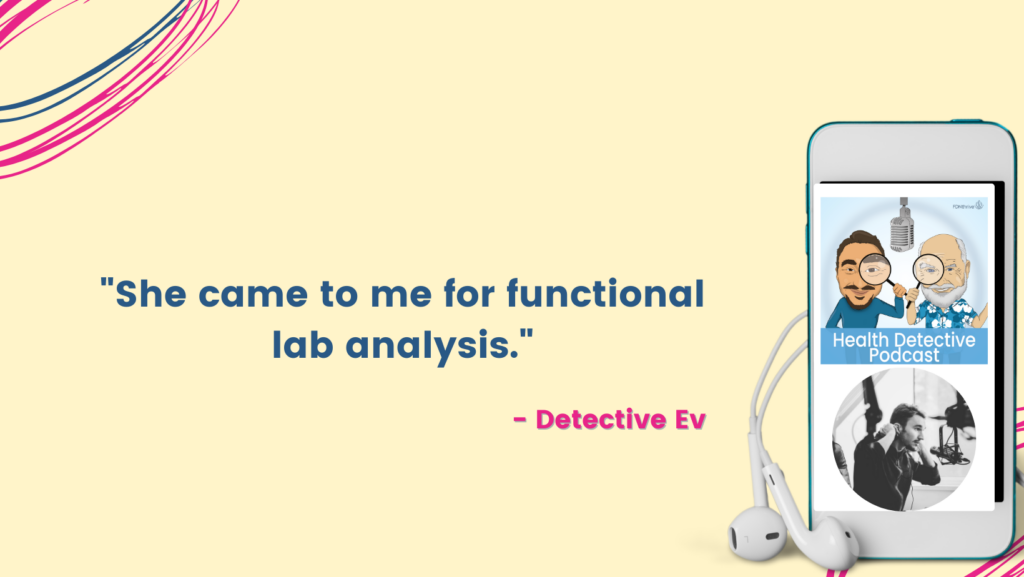
Now, Amanda was a woman, slightly older than me at the time. She was in her like mid to late twenties. She came to me for functional lab analysis. Of course, I get on calls with people and I’m running through all this stuff, just like we do at FDN. You know, we get on calls with people for free. We make sure we actually can help you.
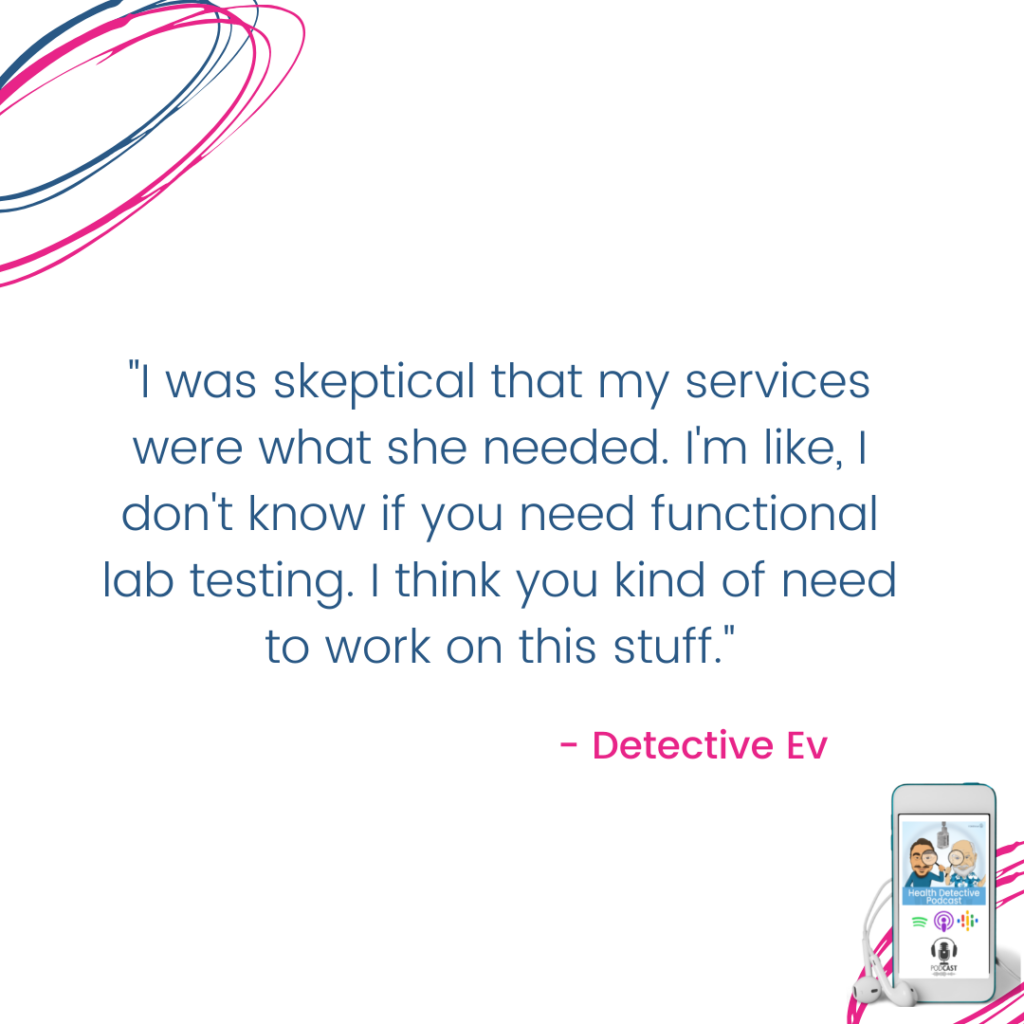
I was a little skeptical. I was skeptical that my services were what she needed. I’m like, I don’t know if you need functional lab testing. I think you kind of need to work on this stuff. And she kept saying, Ev, my mom, I was super lucky. She believed in therapy. I say believed in, because I know that maybe that’s even shocking to some people on here.
But I would assume most of you realize that yeah, a lot of the world is just not caught up with the mental health stuff. They don’t realize the importance of it. They don’t realize that we can talk about it. They don’t even realize that counselors are not for crazy people. Her mom realized that none of that was true (it’s not a bad thing, it’s a good thing), and got her and a sibling into it immediately. And that worked really well.
Post Trauma Health Issues
She had many, many, many years, over a decade actually, to process this loss and deal with those things. She was getting the proper treatment and help from pretty much day one. She was using an SNRI, which if you don’t know, it’s like similar to an SSRI. But instead of selective serotonin re-uptake inhibitor, serotonin norepinephrine reuptake inhibitors. This is why they have abbreviations. These things suck to try to say.
So SNRI, she’s on this thing. She can’t stop taking it for more than three days without crying spells, all this stuff. Really bad things going on. We had multiple calls before I finally got to the point where I was like, okay, I need to trust the person that’s in front of me. She is adamant that she needs to do the lab testing.
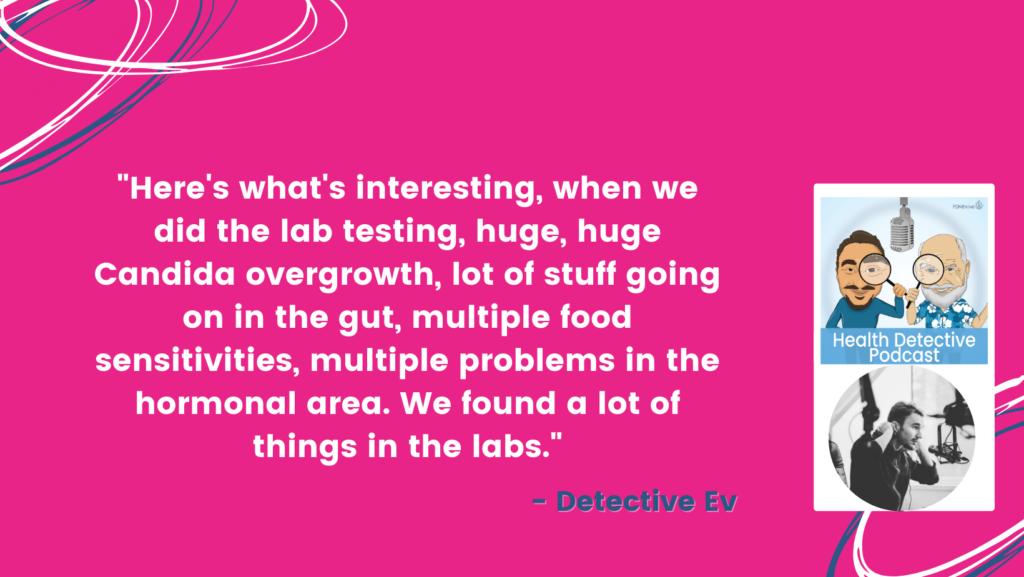
Here’s what’s interesting, when we did the lab testing, huge, huge Candida overgrowth, lot of stuff going on in the gut, multiple food sensitivities, multiple problems in the hormonal area. We found a lot of things in the labs. We found a lot of things on the labs. So, this is where it gets interesting. This is why we’re having this kind of conversation on this type of podcast. Because can trauma affect our mental health?
Absolutely, it can. It can be the cause of mental health issues. But there are certain people, it’s actually quite a lot, that deal with a trauma. They did do what could be considered a reasonable amount of emotional work for that. And now they’re sick and they still have other things going on.
Trauma “Work” Doesn’t Change the Need for Physical “Work”
It’s impossible to tell exactly what was happening in Amanda’s case. I don’t know if just her trauma alone led to the health stuff that she had. But she was correct. She knew her own body and psychology well enough to realize there is something more going on. And she was absolutely right.
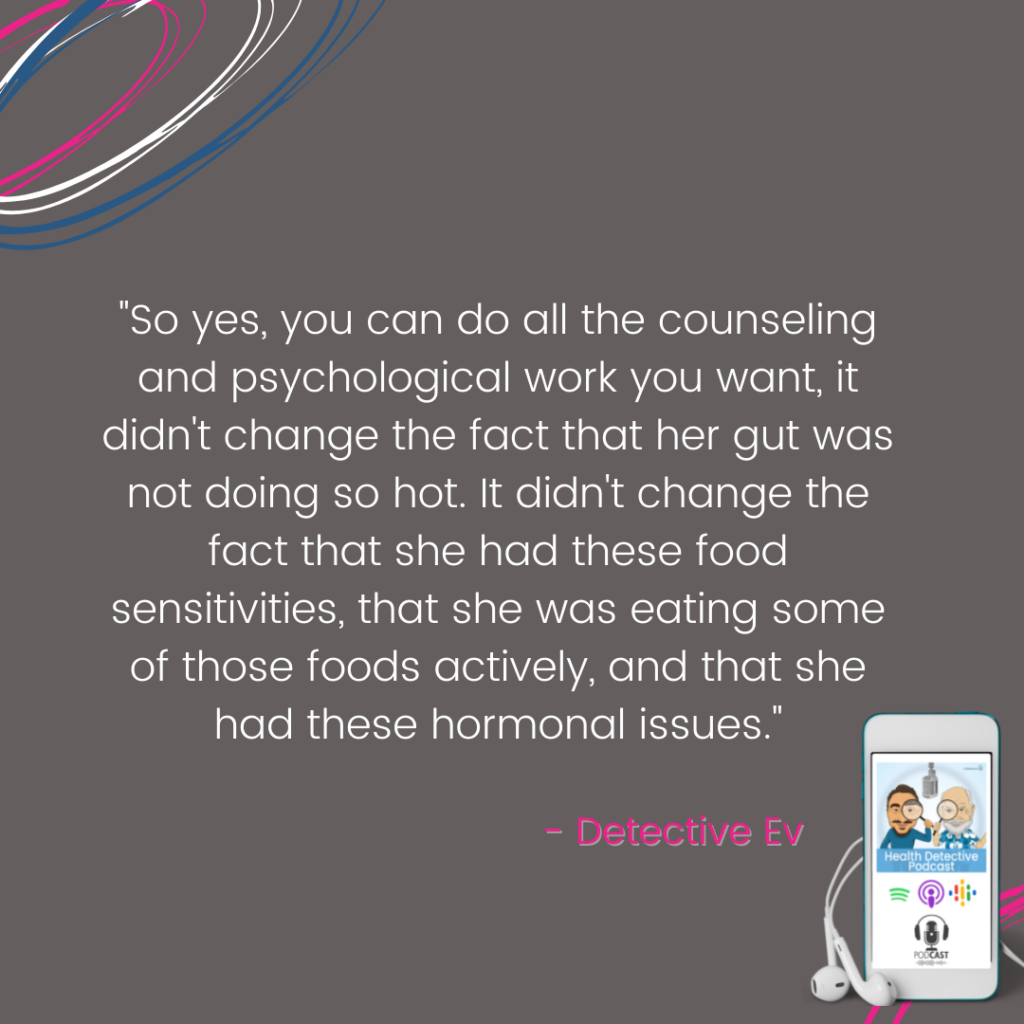
So yes, you can do all the counseling and psychological work you want, it didn’t change the fact that her gut was not doing so hot. It didn’t change the fact that she had these food sensitivities, that she was eating some of those foods actively, and that she had these hormonal issues. We needed to figure that stuff out and look at it.
So, figure out what category you’re in, and then you can make a decision from there. I’m assuming you wouldn’t even be listening to this if you’re in the first category. But perhaps you are like me where maybe trauma just wasn’t that much of a thing in the early stages of life, or at least prior to the mental health issues. You can’t correlate the mental health issues together with the trauma. Okay, well, you definitely need what we’re offering then. That’s pretty much guaranteed.
But then there’s the person where the trauma was so deep and it’s just so unfair, and so unjustified what happened that, yeah, maybe you need to be doing that work before you ever consider anything else. Okay. You might need a medication. I’m not a doctor. It’s not medical advice. I’m just saying that there’s no shame in that. Guys, do what you gotta do.
FDNthrive Will Help Even If It’s to Find You Help
Then there’s the third option, which can go both ways. Maybe you’ve done some of the work. You already are working with the counselor, and you’re like, you know what? I just have this feeling that there’s something more here. Then that might be a time to reach out to us. What we’ll do is the same thing that I did with my client back in the day. That’s actually walk with someone on a phone call to figure out, do we actually have the ability to help them at this time? Are we the best service for them?
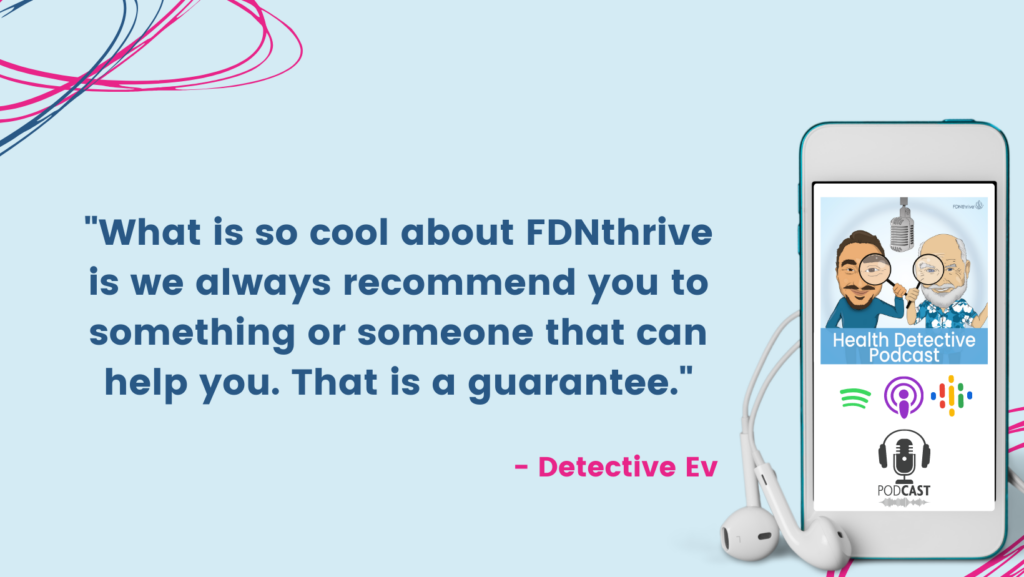
And if we’re not, what is so cool about FDNthrive is we always recommend you to something or someone that can help you. That is a guarantee. No one leaves the phone calls, oh, well, yeah, we couldn’t help ’em. Okay, cool. By the way, have a great day. We couldn’t make a sale. Guys, no one’s thinking here like that. There’s no shortage of clients.
You think there’s a shortage of clients that need functional lab testing. That’s ridiculous. The whole world needs this for the most part right now, but everyone might need it at different times. I shouldn’t have said right now because you know what I meant by that, I think.
Your Level of Healing is Up to You
So, figure out what category are you in? Are you in that first one? Biochemical stuff for sure. Are you in that second category where it’s like pure trauma that needs to be addressed before we ever touch a lab? Or is it number three? Where there seems like there’s something more going on here and you can’t figure it out. Maybe the doctors can’t figure it out. Yet you’re stuck on these medications, and you’re stuck on these other things that maybe necessarily you don’t want to be on for the rest of your life.
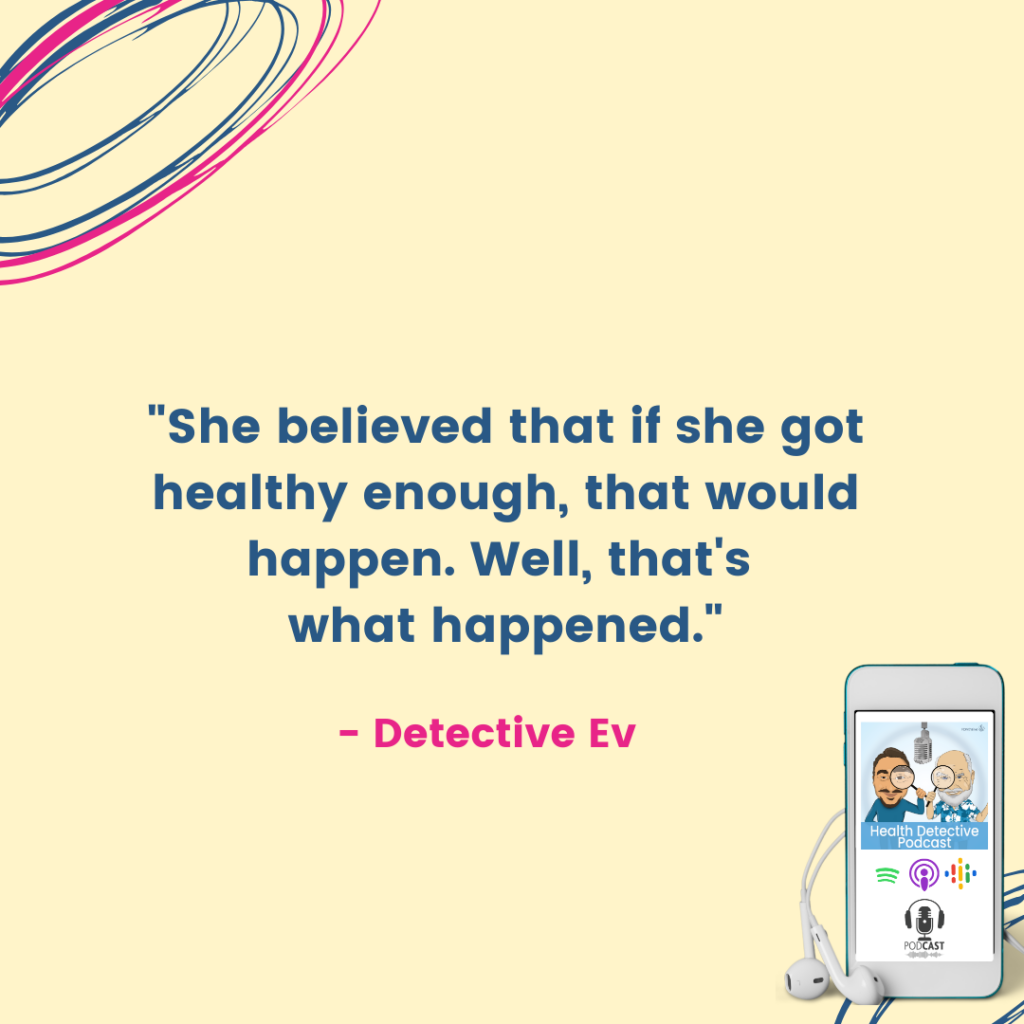
And we don’t get people off medication, but when people get healthier, sometimes they get off medication as a result of that. It happens indirectly. We don’t promise that. We don’t guarantee that. We don’t do that. But that’s what happened with Amanda. Amanda ended up getting off the medication that she was on. Not because that was my goal, but because she wanted to do that. She believed that if she got healthy enough, that would happen. Well, that’s what happened.
This is how trauma can be related to mental health. I divided into those three categories. I’m sure that’s an oversimplification. But for myself, that’s a good place to start and I think it’s straightforward enough for most people listening. So, think about this podcast, short and sweet. Think about what category you’re in and think about which best serves you at this time. Because mental health is important. I think it’s important to everyone nowadays. That’s great, but it’s definitely important to me in a biased way, and I don’t mind having that bias.
Conclusion
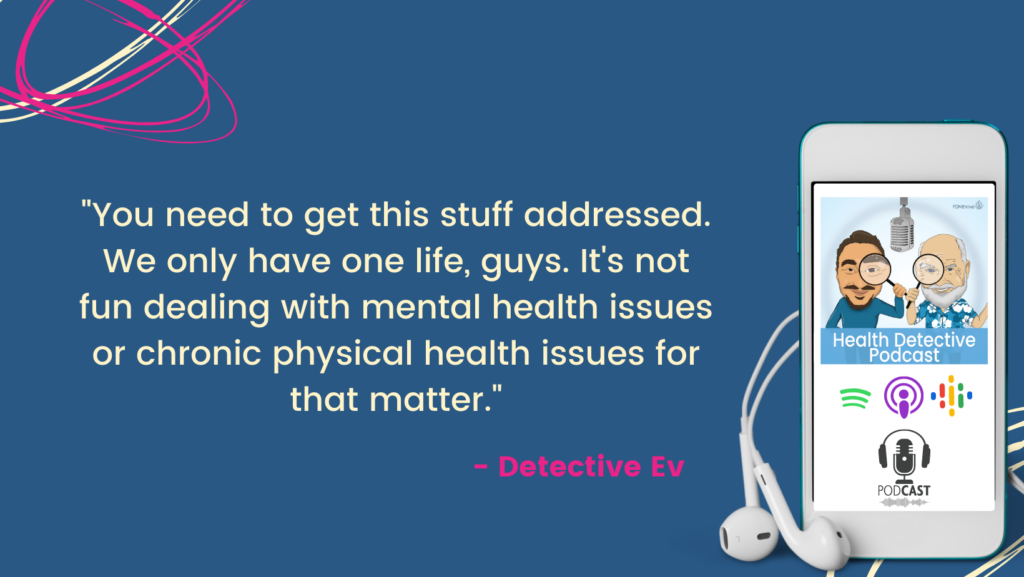
You need to get this stuff addressed. We only have one life, guys. It’s not fun dealing with mental health issues or chronic physical health issues for that matter, but that’s not the point of today’s talk. We need to get it addressed. Figure out what category you’re in, and then have the courage to go pursue whatever you need to pursue.
With that said, I’d like to thank you guys for listening to yet another episode of the Health Detective Podcast by FDNthrive. As always, my name is Evan Transue, AKA Detective Ev. You guys take care. And if you would leave us a five-star review on Apple Podcasts, we would love you even more than we already do.
So, I’m going to shut up. I’m always bad at the exits. I never know how to say goodbye. Okay. Goodbye. Goodbye. Goodbye. I love you guys. See ya. Take care. Goodbye.
Thanks for tuning in to the Health Detective Podcast. If you are finally ready to work with a real health detective on your health journey so that you can get well and stay well naturally, visit us at fdnthrive.com and click on the button to Schedule a Free Health Review

